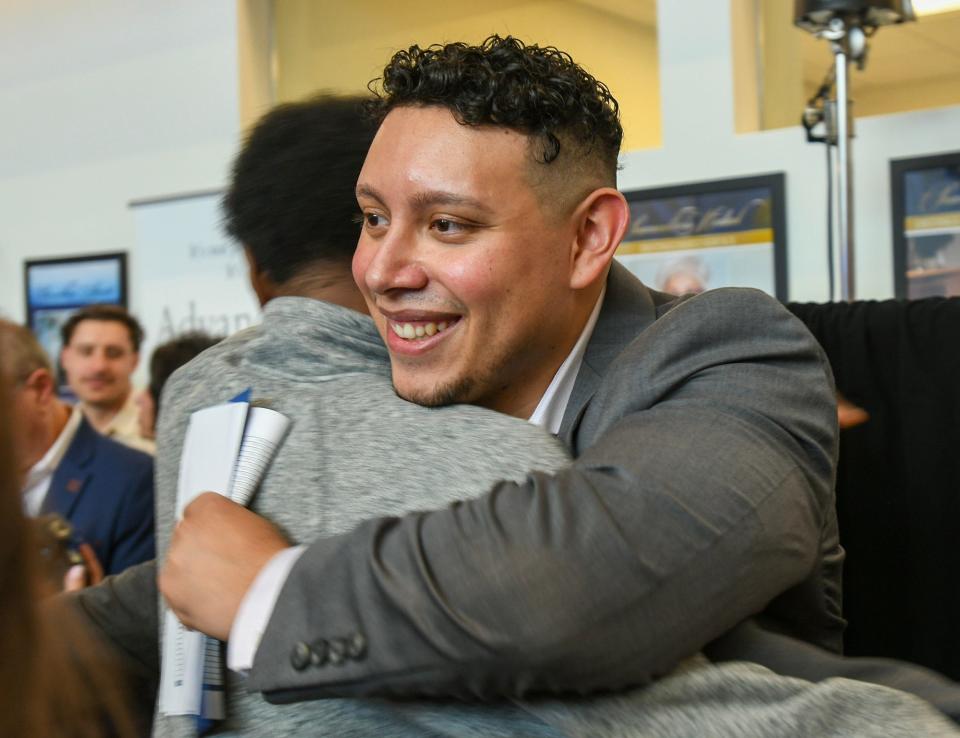Scarcity of primary care doctors: What can be done to fix a severe shortage?
There is a severe shortage of primary care doctors — not just in the Worcester area, but nationwide — and some observers believe it's having a negative impact on our health.
Patients either can’t find one of these doctors or must wait weeks or months for an appointment.
Experts point out several reasons for the scarcity, essentially coming down to longer hours and less pay, compared to specialists trained in areas like cardiology and orthopedic surgery.

The challenge living the lifestyle of a primary care doctor isn’t stopping Christian Pineda. The Fitchburg resident and soon-to-be graduate of UMass Chan Medical School will enter his residency training in family medicine, considered one of the pillars of primary care.
Pineda’s choice doesn’t come without challenges. “Primary care has the least amount of money and the most amount of work,” said Pineda. “The work-life balance and the pay are not exactly ideal. (Primary care) is not as appealing to medical school students.”
Numbers show a shortage
A report from the nonprofit Milbank Memorial Fund appears to support that assessment.
Its 2024 scorecard found the number of primary care doctors per capita fell from 68.4 per 100,000 people in 2012 to 67.2 per 100,000 people in 2021.
In addition, 37% of all doctors in training in 2021 started their residency programs in primary care. However, only 15% of that pool practiced primary care medicine three to five years after residency. More than half went into a specialty or worked in a hospital setting.
Meanwhile, primary care as a share of total health care spending in the U.S. dropped from 5.4% in 2012 to 4.7% in 2021, according to the report.
What is primary care?
Generally recognized as the first line of defense in ensuring our health and well-being, primary care doctors examine us over the course of years during annual checkups and other appointments. The result can be a close relationship between patient and doctor, as the patient's long-term health needs come into clearer focus. If a particular issue is identified that requires more in-depth analysis, the patient can be referred to a specialist.
Besides family medicine, internal medicine and pediatrics are generally considered the foundations of primary care.
Medical student intelligence: It's a factor
Dr. Michael F. Collins, chancellor at UMass Chan, believes the list also includes obstetrics and psychiatry. Collins himself is a primary care doctor, trained as a general internist. When asked why there is a shortage in primary care providers, his answer went directly to the intelligence of medical school students.
“I like to posit that medical students don't get stupid when they come to medical school.”
Collins explained many students are saddled with loans to pay for their education. They choose training in a higher-paying medical specialty in order to pay down the debt faster.
There’s no doubt many specialties are higher paying versus primary care, according to the 2023 Physician Compensation Report from Doximity, which bills itself as the largest community of health care professionals in the U.S.

The average annual compensation of a neurosurgeon ($788,313), orthopedic surgeon ($624,043) and cardiologist ($544,201) far outpaces pediatrics ($242,832), family medicine ($273,040) and internal medicine ($293,894), according to the report.
Collins also noted this generation of medical school students desires a work-life balance and specialties generally come with a set work schedule, unlike primary care.
There’s another factor Collins mentioned — medical students want to treat patients, not spend hours in front of a computer keyboard, punching in electronic medical records and submitting electronic preauthorization requests that insurance companies require for medications and certain steps of care. The Milbank report found 16% of family doctors spent four or more hours daily on electronic heath records instead of patient care.
'Hidden agenda'
Status is also at play, with specialists perceived as occupying a higher rung in medicine compared to primary care. It’s known as the “hidden agenda,” and it can deter medical students from choosing primary care.
“We need to recognize the importance of this workforce to the profession,” said Collins. Recognition must come from insurance companies and large health systems, he said.
"Until we get to that point, I think you’re going to have students vote with their feet,” said Collins. “They’re going to say that's just not for me because if I go into this highly remunerative specialty, my life will not have some of the issues that would be if I choose to go into one that's less remunerative.”
Of the 164 soon-to-be UMass Chan graduates in the class of 2024, 49% matched in primary care residency.
Celebrate these doctors
Primary care doctors need to be celebrated for their work, said Dr. Robert Zavoski, chief clinical officer at Family Health Center in Worcester.
“Our nation has a severe shortage of primary care providers,” said Zavoski. “The work they do is tough every day, it’s incredibly important every day and I wish they had more support than they do.”
When asked where the support should come from, Zavoski described a maze of electronic procedures that doctors must navigate before insurance companies and other layers of bureaucracy approve services like medications and X-rays.
The systems began in the 1970s to save money, but all they did was drive up health care costs, said Zavoski. Managed care followed in the 1980s and 1990s and Zavoski said it created market forces that drove down prices for primary care.
At Family Health Center, where more than 30,000 patients are in the pipeline, many of them low-income, there are approximately 50 primary care providers. Thirty behavioral health specialists and several primary care dentists provide support. Zavoski said those staff numbers are not enough.
“If we had twice as many, they would keep very busy,” he said.
Zavoski also noted that our population is getting older and that likely means more chronic illnesses. Primary care doctors will shoulder the burden and there's not enough of them.
“The challenge for primary care is increasing and increasing,” said Zavoski.
What is the solution?
The short answer, according to industry watchers, is more money must be pumped into primary care to narrow the salary gap between providers and specialists.
Collins believes with all the talk about the shortage in primary care, market forces will shift and lead to higher salaries for these doctors. When asked where the money will come from to level the playing field, Collins said, “That’s been the dilemma in the profession for a long time.”
A pending bill at the Massachusetts State House would pump more cash into the primary care pipeline. Reportedly, the amount would double over a three-year period and a chunk of the funds would come from insurance companies, hospitals and pharmaceutical companies.
Instead of paying primary care doctors for each service provided, payment would be upfront based on patient and industry metrics that predict the amount of health care services needed.
The bill, sponsored by state Sen. Cindy Friedman, D-Arlington, currently sits in the Joint Committee on Heath Care Financing. State Sen. John Cronin, a Lunenburg Democrat and senate co-chair of that committee, said the bill’s intent is to improve patient access to primary care. The thinking is better management of patients’ health will lower overall costs, resulting in fewer patients needing more expensive hospital and emergency room care.
Good idea, but skeptical
Zavoski believes the bill is a “good idea,” but he’s skeptical. His prior job as medical director of the Connecticut Department of Social Services, when he helped lead Connecticut’s Medicaid Program, showed him that hospitals, insurance outfits and pharmaceutical companies don’t like seeing bills cut into their profit margins.
“It's a safe bet they're not going to let it happen,” said Zavoski of those entities torpedoing Friedman’s bill.
Cronin noted the bill is part of a larger debate on how to contain costs, while providing essential health care services. He expects that debate will continue through the end of this legislative session in July.
“The trajectory we’re headed in the primary care field is not a good one,” said Cronin. “We have an aging workforce in the primary care field. Not a lot of young doctors are going into it.”
MassHealth, the state’s Medicaid insurance program, started a program last year that pays a set fee per patient, instead of each procedure. “I think it’s a huge step forward,” said Zavoski, “but you don’t turn an aircraft carrier in a bucket. It’s going to take time and I think it’s a step in the right direction."
Meanwhile, Massachusetts offers a loan repayment program for some primary care professionals, including those working in dental, medical and mental health. Some communities are primary care deserts and loan repayment is a way to encourage doctors and other providers to work in those areas.
Collins said artificial intelligence could free primary care doctors from the "hassle factors" of electronic records and prior insurance authorizations, so they can spend more time treating patients.
Not easy finding a primary care doctor
Time will tell if these efforts are successful. Meanwhile, Zavoski experienced firsthand the current shortage of primary care doctors. When he and his wife moved to Worcester two years ago, his insurance company assigned a provider that wasn’t taking new patients.
Nearly a year later, they found a primary care doctor. It took persistence from Zavoski, a pediatrician for 42 years, and his wife, an insurance executive for 20-plus years, to do it.
"If we have trouble finding a primary care provider, imagine someone who doesn’t have our medical background or if English is not their native language," he said.
Contact Henry Schwan at henry.schwan@telegram.com. Follow him on Twitter @henrytelegram
This article originally appeared on Telegram & Gazette: Primary care doctors: What can be done to fix a severe shortage?

